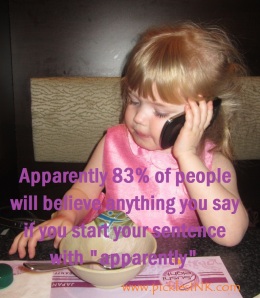I’m banning the word “apparently.” Blanket Ban.
Think about it – any sentence that you need to start with the word “apparently” is probably not worth saying. We use it to repeat things that we don’t know to be fact without having to cite our sources:
“Apparently it’s going to rain tomorrow.” “Oh, did you check the weather?” “Uh, no…I just overheard one of the other moms at school talking about it, so don’t blame me if you don’t sunscreen your kid and it turns out to be 30°C.”
“Apparently Rob Ford saved $1 billion for Toronto last year!” “No way – Really? That totally overshadows that whole crack thing!” “Yeah! Apparently that video was a hoax anyway – we all know videos can be altered! Apparently he’s never been under the influence of anything in his life. And apparently he in no way had the video buried. In fact, apparently the guy in the photo with the dead drug dealer wasn’t even him – It was his evil twin from an alternate dimension.“*

Molly chatting on Blackberry “Apparently 83% of people will believe anything you say if you start your sentence with ‘apparently'”
The trouble with “apparently” is twofold:
First, to quote The Princess Bride, “I do not think it means what you think it means.” “Apparently” actually means, “It is apparent that,” as in, “I can observe with my own senses that,” but we generally use it to mean, “I have read or heard that this is the case.”
Second, it lends an air of veracity to a subsequent statement that it does not necessarily deserve. In everyday speech, we frequently use “apparently” to mean “I don’t actually know firsthand if this is true, so don’t blame me if you later discover it to be false,” often with an undercurrent of, “And you probably wouldn’t be so quick to believe me if I told you where I had heard it.”
If you banish the word “apparently” from your vocabulary, you are forced precede your statement by actually stating your source:
“I vaguely remember hearing somewhere that…”
“I read on the Internet that…”
“Someone shared this picture on Facebook that said…”
“I got this chain email that said…”
“I read in the National Enquirer that besides Batboy being elected to the Vatican council…”
Try it for a day – banish “apparently” from your vocabulary and see how it changes what you do and don’t say.
Look at all the nonsense that would be done away with!
Pinterest hoaxes: “Apparently if you mix hydrogen peroxide and Mountain Dew…” Have you tried it? NO! Then don’t spread it!
Facebook hoaxes: “Apparently there’s this new gang initiation thing where they leave baby carseats by the side of the road…” Did you Google it? What did Snopes say? *EEAANNNGHHH* Urban legend!!
Academic mumbo-jumbo: “My preliminary meta-analysis of my PhD research indicates…” <— Hey, when you put it that way, that one I’ll actually buy!
~ karyn
*NB – I made this joke BEFORE I came across the Daily Currant article. APPARENTLY great minds think alike!
Did you try my “No apparently for a day” challenge? How did it go?